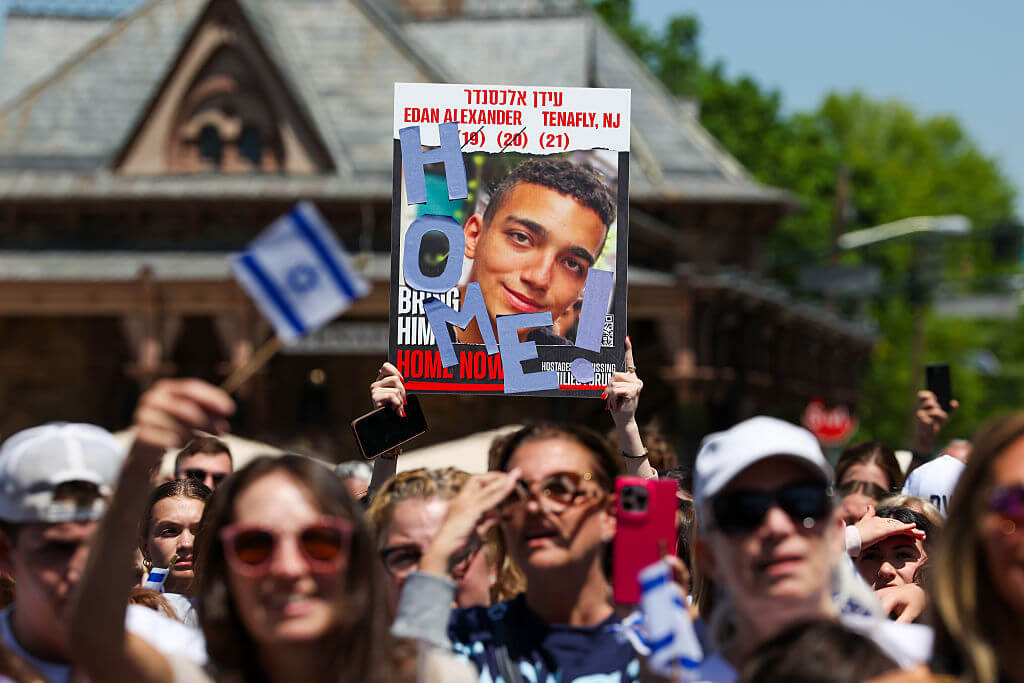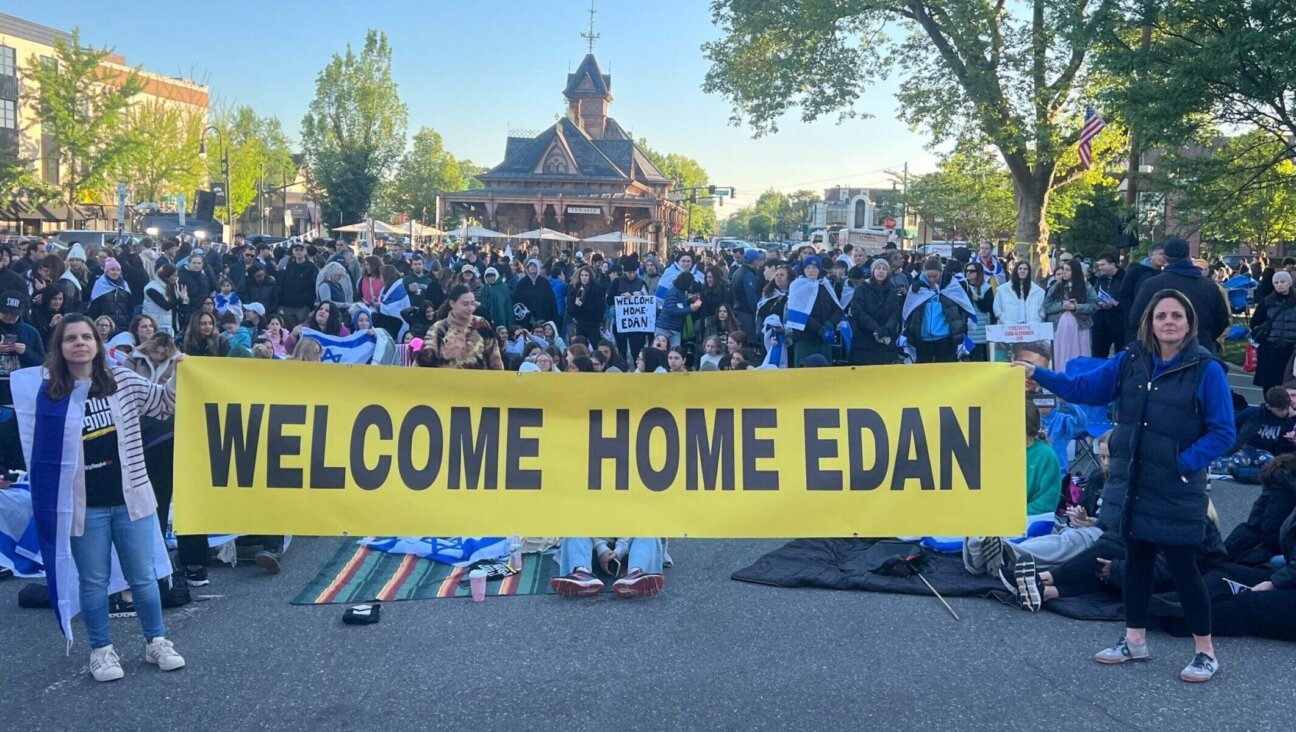Mahmoud Abbas Comes Under Fire for Mourning ‘Hated’ Shimon Peres

Mahmoud Abbas Image by Getty Images
The presence of Palestinian Authority President Mahmoud Abbas at the funeral of Shimon Peres on Friday — the only Arab head of state to attend — has highlighted internal divisions within the Palestinian camp, evoking ambivalence from supporters and indignation from political foes.
Abbas was subjected to harsh criticism across much of the Arab world for his conciliatory message of condolence to the Peres family after his death. In the letter, published just hours after the former Israeli president passed away on Wednesday morning, Abbas said he was saddened by his death and described him as “a partner in forging the peace of the brave.”
In a Facebook post Friday morning, Abbas’ Fatah faction criticized his decision to attend the funeral, commenting on footage of Abbas shaking hands with Israeli Prime Minister Benjamin Netanyahu.
But “despite our displeasure with the President’s attendance at Peres’ funeral, we know [he is just as patriotic as we are] and we don’t have all the information,” read the statement. “We know that many in the Israeli public have taken the rhetoric and policies of Abu Mazen to heart, declaring their solidarity with us and, in the future, pressuring their government,” it said, referring to Abbas’ nickname.
Afterwards, Munir al-Jaghoub, a spokesman for Fatah, justified Abbas’ decision to attend the funeral for international diplomatic reasons.
“We as Palestinians must realize that his participation sends a strong Palestinian message of peace to the world, especially at a time when the international community is monitoring its responsible position. [This message] could be one of the most important among participating countries,” Jaghoub said.
On Thursday, however, Jaghoub tweeted a cartoon of Peres standing next to the Grim Reaper as he holds a list of Peres’ crimes against the Arabs.
The same ambivalence could be found in another message posted on Fatah’s Facebook page Friday, in which it followed the initial criticism by claiming that Abbas’ participation in the funeral “blocked the way for the Netanyahu government to incite against the Palestinian Authority, as Israel tries to convince the world it is confronting opponents who only believe in violence and weapons.”
For its part, Hamas used Abbas’ avowed appreciation for Peres to portray him as a traitor to his people.
Nashat Aqtash, a communications professor at Birzeit University near Ramallah who advised Hamas in the 2006 elections, told Haaretz that Abbas’ attendance at the funeral “caused Palestinians to feel their president doesn’t respect their feelings.”
“Palestinians despise Peres more than they despise [former Israeli Prime Minister Ariel] Sharon,” he said. “Sharon may have starved the Palestinians, but Peres besieged them with his soft-spoken rhetoric. That’s worse.” In an official statement issued on Thursday, Hamas said that the PA leader’s expression of condolences was “an insult to the blood of the martyrs and the suffering of the Palestinian people.” The statement added that “the Palestinian people are pleased by the death of the criminal Shimon Peres.”
In a separate statement on Thursday, Hamas spokesman Sami Abu Zuhri called on Abbas to take back his decision to attend the funeral, claiming it would encourage other Arab leaders to follow suit. Hamas-affiliated news outlets on Facebook were enraged by Abbas’ attendance of the funeral and particularly his handshake with Netanyahu.
Gaza-based Shehab News Agency posted a screen capture of Abbas bowing his head during one of the speeches, along with the hashtag “taking part in condolences for Peres is treason.” That image has gone viral, with some claiming it depicts Abbas shedding a tear.
Quds News Network, another popular Facebook page, dedicated an article to popular reactions on the Palestinian street to Abbas’s decision to travel to Jerusalem. They were unfailingly negative.
“He was the number one propagator of the illusion of compromise which he marketed and sold us,” said Badran Jaber, a leader in the Popular Front for the Liberation of Palestine. “The result is the blood of martyrs, settlement activity, and land appropriation [by Israel] which all mark the current situation.”
The Forward is free to read, but it isn’t free to produce

I hope you appreciated this article. Before you go, I’d like to ask you to please support the Forward.
Now more than ever, American Jews need independent news they can trust, with reporting driven by truth, not ideology. We serve you, not any ideological agenda.
At a time when other newsrooms are closing or cutting back, the Forward has removed its paywall and invested additional resources to report on the ground from Israel and around the U.S. on the impact of the war, rising antisemitism and polarized discourse.
This is a great time to support independent Jewish journalism you rely on. Make a gift today!
— Rachel Fishman Feddersen, Publisher and CEO
Support our mission to tell the Jewish story fully and fairly.
Most Popular
- 1

Fast Forward Ye debuts ‘Heil Hitler’ music video that includes a sample of a Hitler speech
- 2

Opinion It looks like Israel totally underestimated Trump
- 3

Culture Is Pope Leo Jewish? Ask his distant cousins — like me
- 4

Fast Forward Student suspended for ‘F— the Jews’ video defends himself on antisemitic podcast
In Case You Missed It
-

News In Edan Alexander’s hometown in New Jersey, months of fear and anguish give way to joy and relief
-

Fast Forward What’s next for suspended student who posted ‘F— the Jews’ video? An alt-right media tour
-

Opinion Despite Netanyahu, Edan Alexander is finally free
-

Opinion A judge just released another pro-Palestinian activist. Here’s why that’s good for the Jews
-
Shop the Forward Store
100% of profits support our journalism
Republish This Story
Please read before republishing
We’re happy to make this story available to republish for free, unless it originated with JTA, Haaretz or another publication (as indicated on the article) and as long as you follow our guidelines.
You must comply with the following:
- Credit the Forward
- Retain our pixel
- Preserve our canonical link in Google search
- Add a noindex tag in Google search
See our full guidelines for more information, and this guide for detail about canonical URLs.
To republish, copy the HTML by clicking on the yellow button to the right; it includes our tracking pixel, all paragraph styles and hyperlinks, the author byline and credit to the Forward. It does not include images; to avoid copyright violations, you must add them manually, following our guidelines. Please email us at [email protected], subject line “republish,” with any questions or to let us know what stories you’re picking up.














